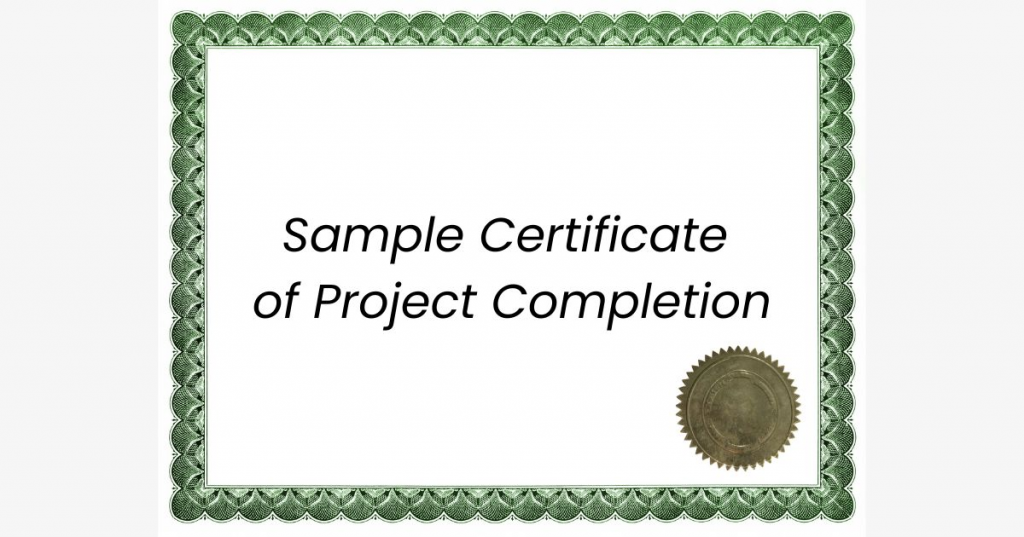Certificate for Project: What & How to GET IT?
Are you involved in software projects and want to streamline processes and improve outcomes? A certificate in projects can be your secret weapon! Learn about the different types of certifications available and how they can boost your skills and career prospects with SkillTrans!
What is a Certificate in Project?
Before coming to the specific definition of a certificate in projects, we will come to the general definition of a certificate through the definition from Wikipedia:
"Certification is part of testing, inspection, and certification and the provision by an independent body of written assurance (a certificate) that the product, service, or system in question meets specific requirements. It is the formal attestation or confirmation of certain characteristics of an object, person, or organization. This confirmation is often, but not always, provided by some form of external review, education, assessment, or audit. Accreditation is a specific organization's process of certification. According to the U.S. National Council on Measurement in Education, a certification test is a credentialing test used to determine whether individuals are knowledgeable enough in a given occupational area to be labeled "competent to practice" in that area."
From there, to understand more briefly and simply: A project certificate is a type of certificate awarded to people who successfully complete project conditions after completing a project.
In the context of software projects, project certifications can be classified into four types of certifications including:
Professional Certifications.
Course Completion Certificates.
Micro-credentials.
And Project Completion Certificates.
Professional Certifications
Broad Project Management Certifications: These focus on general project management principles and methods. They are industry-agnostic and applicable to various fields, including software development.
Here are some prominent examples:
Project Management Professional (PMP)® from the Project Management Institute (PMI) is one of the most globally recognized project management certifications.
Certified Associate in Project Management (CAPM)® also by PMI, is a more entry-level option.
PRINCE2® (Projects IN Controlled Environments) is methodology-specific and popular in the UK and Europe.
Specialized Software Project Management Certifications: These certifications are tailored to software development methodologies.
Here are some typical examples:
Scrum Alliance Certifications: Include Certified Scrum Master (CSM), Certified Scrum Product Owner (CSPO), and others.
Scaled Agile Framework (SAFe) Certifications: Cover various roles and levels within the SAFe framework for scaling agile to larger organizations.
Course Completion Certificates
Software Development Training: Many online courses and training programs in software development, project management, or specific tools provide certificates of completion. These demonstrate your commitment to learning and acquiring new skills.
Vendor-specific Certifications: Software vendors like Microsoft or Atlassian sometimes offer certifications for proficiency in their project management tools (e.g., Microsoft Project, Jira).
Micro-credentials
Short Online Programs: Platforms like Coursera, Udemy, edX, or SkillTrans often provide micro-credentials or specialized certificates in aspects of software project management. These are quick but focused ways to learn specific skills (Risk management, Agile practices, etc.).
Project Completion Certificate
The project completion certificate is a certificate issued by a business or company to project personnel after a large project is completed. This certificate includes the achievements that the employee has performed and also highlights the skills that the employee has demonstrated well in the project.
Project certifications are commonly found in manufacturing and software outsourcing companies, and positions with the opportunity to receive project certifications include but are not limited to:
Product Manager: Certifications give product managers a solid foundation in project scoping, resource allocation, and the full product development lifecycle, ensuring product success.
Testing Software: Even in agile environments, testers benefit from understanding project methodologies to plan testing cycles effectively and communicate issues clearly within the project context.
Business Analyst: Project management knowledge helps BAs analyze requirements with a project mindset, considering feasibility, timelines, and dependencies for clear documentation and solutions.
Developer: While primarily code-focused, developers benefit from understanding project structure to align their work with milestones, sprints (in agile), and overall project objectives.
Designer: Project awareness helps designers create solutions that fit within broader timelines, budgets, and technical constraints, increasing the value of their contributions.
Marketer: Understanding project flow enables marketers to align campaigns and messaging with product releases and project milestones, maximizing the project's overall impact.
Project Managers/Coordinators: Naturally, direct project management roles heavily benefit from specific certifications (PMP, PRINCE2, CSM, etc.)
Operations Managers: In overseeing processes and workflows, project management skills optimize efficiency and cross-team collaboration.
Data Analysts: Often handling data-driven projects, certifications help with defining project scope, managing data collection, mastering data analysis tools, and communicating insights to stakeholders.
Sales/Customer Success: Understanding project cycles allows reps to manage client expectations, align proposals with feasibility, and increase overall customer satisfaction.
The specific certification's value depends on the company, industry, and the role's scope. For instance, the PMP is broadly applicable, while Agile certifications (e.g., Scrum Master) are vital in software development.
How to Get a Certificate for Project Completion?
There are a few different routes you can go when it comes to getting a certificate for project completion in software projects.
Here are the most common ways and things to consider:
Course Completion Certificates

Course Completion Certificates as mentioned above are a type of certificate that will be issued after completing a course provided by an organization. You can get them by:
Platforms: Reputable online course platforms like Coursera, Udemy, LinkedIn Learning, SkillTrans, etc., offer project management courses specifically tailored to software development.
Benefits: These provide targeted knowledge on managing software projects, often including Agile methodologies. Great for supplementing existing skills or getting started in project management.
Considerations: May not have the same universal recognition as traditional certifications. Choose courses with strong reputations.
Internal Company Certificates
A type of certificate provided by an intern/fresher training organization or a project completion certificate for members provided by the company. You can get them by:
Company-Based Training: Some organizations have internal training programs and may issue certificates upon completion.
Benefits: Highly relevant to the company's specific processes and tools. Demonstrates commitment to professional development within the company.
Considerations: Might have less value when switching companies, unless your organization is widely recognized.
Project Completion Documentation

In addition to receiving a certificate, you can prepare documentation, describing the information in the project, helping it act as a "certificate".
Project Reports and Reviews: Even without a formal certificate, well-documented project completion reports and successful post-project reviews demonstrate your contributions.
Benefits: This is your baseline. Highlight key successes, challenges overcome, and lessons learned on your resume or portfolio.
Considerations: Less standardized than a formal certification, but essential regardless.
Each type of completion certificate has in common that it shows the employer or client the skills you have (can be hard skills or soft skills), your valuable contributions to the project, or the responsibilities you have to carry in the project.
Certificate for Project Sample for Instructors and Organization
Let's say you are an instructor or an organization that provides teaching, training, or projects to earn certification. What should you include in that certificate?
Here's a sample "Certificate of Project Completion" that instructors and organizations can adapt, along with key considerations when designing such a certificate:
Sample Certificate of Project Completion

[Organization/Instructor Logo]
Certificate of Project Completion
This certificate is awarded to:
[Participant Name]
In recognition of the successful completion of the project:
[Project Title]
Completed on:
[Date of Completion]
Project Highlights:
[Briefly list 2-3 key objectives or outcomes of the project]
Instructor/Organization: [Instructor/Organization Name]
[Signature of Instructor/Authorized Representative]
You can customize the above template depending on the company's characteristics, position, and training type.
Key Considerations for Customization Certificate
We have suggestions for you about key considerations for customization certificate right here:
Purpose: Is the certificate for internal recognition within a course or program? Does it acknowledge participation in a larger organizational initiative?
Branding: Match the certificate's look and feel to your organization or course branding for professionalism.
Specificity: Can you add details like the participant's role in the project (leader, team member)? Could you include a short list of skills demonstrated, especially if tied to the course/program's learning objectives?
Formal vs. Informal: Decide on the language and overall tone based on the certificate's purpose.
Verification: Determine if there's a way to verify completion if the certificate serves purposes beyond internal recognition.
Tiered Certificates: You could offer different levels of recognition (e.g., "Completion," "Completion with Honors") based on performance criteria.
Digital Badges: Consider supplementing physical certificates with digital badges that participants can showcase on professional platforms like LinkedIn.
Participant Feedback: Get input from learners about what makes the certificate valuable to them. It enhances their perceived value.
If you customize your certificate offering well enough, you will definitely attract a lot of people to participate in the certification process!
Conclusion
In the competitive software development landscape, project certificates signal your competence to potential employers and clients. They validate your ability to manage complex projects effectively, adhering to proven methodologies and delivering tangible results. Investing in certifications not only boosts your individual value proposition but also enhances the overall reputation of your development team!
If you are interested in a certificate of completion, please spend some of your reader's time on SkillTrans - An online learning website for all ages and all professions! You can visit SkillTrans to find and learn new skills in many new careers completely free! In addition to free courses, we also partner with reputable organizations that offer paid courses and certifications in every industry.
Wishing you success on your learning journey!
SkillTrans Content Team

Meet Hoang Duyen, an experienced SEO Specialist with a proven track record in driving organic growth and boosting online visibility. She has honed her skills in keyword research, on-page optimization, and technical SEO. Her expertise lies in crafting data-driven strategies that not only improve search engine rankings but also deliver tangible results for businesses.



